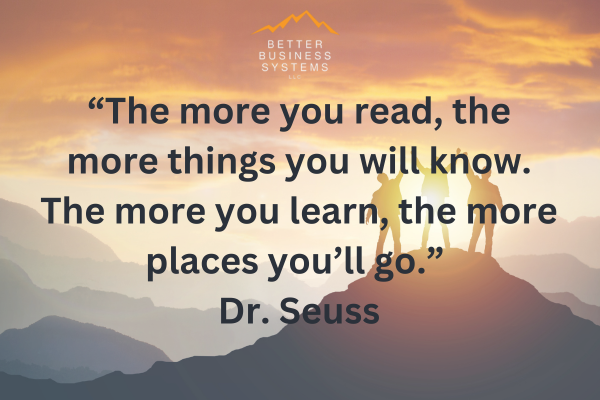Great Leaders Are Great Learners
Today’s leaders are dealing with the constant pace of change and the possibility of future disruption. As a result, the majority of current CEOs feel that they will need to reinvent their businesses in the future, with 40% believing their organization won’t be economically viable within the next decade.
Given that we’re working in a world where change is faster than ever, one of the most important things a leader can do is to become a constant learner. In fact, research shows that the half-life of any skill is about 5 years, meaning that much of what you learned 10 years ago is obsolete and half of what you learned 5 years ago is irrelevant.
That’s why learning and leadership are inseparable. We cannot be effective leaders if we’re not continuously learning. There is no end-point. The more you learn, the better you’ll lead.
Growth Mindset
Research shows that people with a growth mindset are better at dealing with change, solving problems, successfully implementing and giving feedback, and accomplishing goals. They recognize patterns, make better, faster decisions, drive innovation and stay relevant.
Savvy leaders recognize this means investing in their own learning journey, so they can develop the processes and behaviors required for ongoing success.
Here are some reinforcing quotes from some of our greatest leadership OGs!
“The best leaders are lifelong learners; they take measures to create organizations that foster and inspire learning throughout.” John Wooden
“Leaders must get comfortable with living in a state of continually “becoming,” in a perpetual beta mode.” Kenneth Mikkelsen and Harold Jarche, Harvard Business Review.
“Anyone who stops learning is old, whether at 20 or 80. Anyone who keeps learning stays young. The greatest thing in life is to keep your mind young.” Henry Ford
“Just because you are on the leadership team, don’t think you have ‘landed.’ You must continually increase your learning, the way you think, and the way you approach the organization.” Indra Nooyi, former CEO of PepsiCo
Here are some ideas for fitting learning into a busy schedule and becoming a self-directed, autonomous learner.
1. Have a growth mindset.
This is an attitude that we can all improve our skills, abilities and emotional intelligence. In fact, the science of neuroplasticity shows that the brain can reorganize pathways, create new connections and even change how its circuits are wired – with time, effort and energy!
2. Ask yourself 3 questions.
1) “What can I learn?” 2) “What should I learn?” 3) “What do I want to learn?”
3. Find your best way of learning.
Think about how you prefer to learn. Whether podcasts or reading books and articles, discover what works best for you.
4. Try new ways of learning.
If you only stay in your comfort zone, you won’t have exposure to new experiences that could help you grow and develop.
5. Learn from mistakes.
The best leaders learn from experiences, including failures – and apply those lessons to unfamiliar situations in the future. Think about some of your greatest failures and what you learned from it. Practice turning challenges into opportunities rather than threats.
6. Practice active listening.
Listen and learn from others, whether colleagues, customers, family members or friends. Find new ways to apply the information. In his book, “What Got You Here Won’t Get You There,” executive coach, Marshall Goldsmith states: “80% of our success in learning from other people is based on how well we listen!”
7. Take “Clarity Breaks.”
Because the normal course of day-to-day business activity can pull you deeper and deeper into the minutiae, stay sharp, confident, and at your best for your people by taking time on a regular basis for a “clarity break.” Schedule a regular appointment with yourself, off-site preferably, to work “on” the business, rising above the everyday demands of the job and thinking at the 30-thousand-foot level.
8. Consider digital tools.
Since the pandemic, digital tools are revolutionizing the way we learn. With so many online learning tools available, there is no excuse not to continue your learning.
9. Share your knowledge.
Exchange resources, ideas and experiences with your network. Write an article for your trade journal, post a blog on your company’s website, arrange a webinar or give a speech at an industry event. While sharing knowledge will help reinforce learning, it will also position you as a thought leader and build your reputation and trust.
10. Invest in your team.
Great leaders invest in their team’s development the same way that they invest in themselves. Learning becomes part of the organization’s DNA, creating strong motivated teams and fostering a culture where everyone is empowered to reach their full potential.
Commitment to life-long learning is the mark of great leadership, ensuring the future success of an organization. It keeps us relevant. And if we instill a culture of learning, our businesses will always have a competitive advantage. Best of all, we become infinitely more useful in the service of others. What is your commitment to life-long learning?
Sources:
https://www.pwc.com/gx/en/issues/c-suite-insights/ceo-survey-2023.html
https://hbr.org/2015/10/the-best-leaders-are-constant-learners
https://hbr.org/2020/01/to-be-a-great-leader-you-need-the-right-mindset


